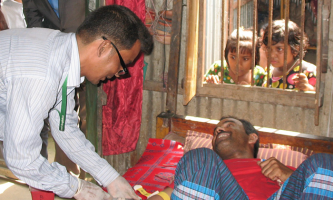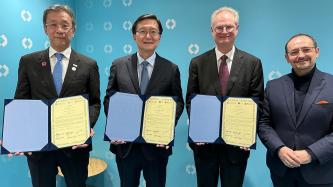
UChicago joins local partners to change how medicine is taught in India

The University of Chicago’s growing presence within the Indian medical community has created major research partnerships, supported faculty exchange, and implemented meaningful policy and educational reform in India. Most recently, in July 2019, the efforts of UChicago faculty and Indian partners culminated in the release of an updated undergraduate medical curriculum that for the first time will include training on disability rights and dignity. This change is the result of years of advocacy and education by University of Chicago’s Professor Vinay Kumar and his local partners, marking another significant milestone in the University of Chicago’s efforts and partnerships with the medical community throughout India.
Dr. Kumar and Dr. Satendra Singh of the University College of Medical Sciences in Delhi initially met during a conference in 2015, where they began discussing the need for further emphasis on soft skills within Indian medical education, as well as UChicago’s strength in the area. From there, with the help of a UChicago Global faculty award, Dr. Kumar organized a series of conferences and exchange visits in 2016-18 focused on the lack of curricular focus on the humanities in India, and eventually identifying disability rights as an area likely to yield results. Eventually, Dr. Kumar and Dr. Singh, along with their colleagues, created a document recommending specific competencies regarding understanding how to work with disabled patients and caregivers that was presented to the Medical Council of India. On July 17, 2019, the MCI announced the resulting curricular addition of disability training based on their proposal. This achievement is certainly not the end of the journey, as UChicago faculty and Indian partners continue to promote increased incorporation of soft skills into medical education; notably, UChicago’s Dr. Monica Peek is currently working on presenting the MCI with a proposal for inclusion of shared decision making between doctors and patients as a topic in the medical curriculum.
The addition of disability training for medical students is a continuation of a focused effort in the Indian medical community to shift from a knowledge-based curriculum towards a competency-based curriculum that emphasizes the importance of doctor-patient relationships, in addition to other more humanity focused areas - the so called “soft skills” of medical practice. The University of Chicago has long been a leader in these areas. Through centers like the Bucksbaum Institute for Clinical Excellence and the MacLean Center for Clinical Medical Ethics, as well as the Pritzker School of Medicine’s own medical curriculum, the University has amassed a body of expertise on promoting and respecting the patient as an integral part of the treatment process, and that expertise has resulted in several international partnerships focusing on implementing the same priorities in other medical systems.
The University of Chicago also has an extensive history of medical partnerships and advancement with Manipal Academy of Higher Education, a leading private university in the Karnataka region of India with a highly-ranked medical school, the Kasturba College of Medicine. This educational partnership began in 2013, when Dr. Scott Stern and Dr. Vinay Kumar began visiting Manipal in order to train faculty and students in UChicago’s highly regarded Clinical Pathophysiology and Therapeutics course (CPPT). CPPT, run by Dr. Scott Stern and Dr Aliya Husain, is a comprehensive course on disease providing an integrated introduction to Pathology and Clinical Medicine. In addition to traditional didactic lectures, this course exposes students to online cases to enhance both their understanding and interest in the material. From 2015-2018, Dr. Stern visited Manipal multiple times to train faculty and students to utilize and develop their own version of this intensive course. With the help of UChicago faculty, Manipal has been running their own preliminary version of CPPT for the last 2 years and hopes to have a fully-formed version of the course within a year.
The next steps of UChicago’s partnership with Manipal will focus on diagnostic reasoning skills. Diagnostic error is shockingly common and Dr. Stern and colleagues Dr. Adam Cifu and Dr. Diane Altkorn have studied this are extensively since 2002, culminating in their textbook Symptom To Diagnosis (McGraw-Hill) which released its 4th edition in 2020. With support from the Marcus Foundation, Dr. Stern is creating new web-based tools to teach students worldwide this difficult skill. This curriculum and tools will be developed and shared with Manipal which can then serve as a regional center for other medical schools in the area.
The trend in Indian medical education of moving from a knowledge-based to a competency-based curriculum reaches not only the education field, but healthcare operations as well. UChicago’s Dr. David Meltzer continues this trend through his Comprehensive Care Program (CCP) study, which provides evidence that healthcare outcomes improve when physicians rearrange their practices to allow them to treat the same patients in both clinics and hospitals. Pragna Rao, former Dean of Kasturba Medical College, Manipal, attended a 2015 conference at the Center in Delhi where Dr. Meltzer was presenting this research and pursued a collaboration, leading to the establishment of another partnership with Manipal University to develop strategies to introduce this program to their hospital
In 2017, the development of Dr. Meltzer’s partnership with Manipal was funded through a UChicago Global faculty award. After the partnership was established, multiple UChicago and Manipal faculty and staff participated in a faculty exchange to discuss ways of adapting the program to align with Manipal’s existing medical system.
The next step for the study is to gather quantitative and qualitative data at a community hospital in the Manipal system that describe the experience of patients with complex conditions requiring frequent hospital visits. Patient care in this context is often fragmented through treatment by multiple doctors, making it difficult to treat the condition in its entirety. This ‘needs assessment’ will analyze how patients and providers perceive this fragmentation, and other aspects of the health system that impact care. Dr. Meltzer and his team believe the results of this assessment and other outcomes of this collaboration will contribute to the discussion of new models of high-quality care in India, with the goal of improving health outcomes and quality of care.
UChicago’s collaborations within India’s medical field extend to numerous other projects with significant global impact. Other examples include Dr. Mohan Gundeti’s work in developing a minimally invasive pediatric surgery program in India and Southeast Asia. Renowned cancer researcher Dr. Marsha Rosner has worked with the UChicago Center in Delhi to organize a series of conferences focused on the formation of a strategic partnership in cancer research between UChicago and Indian medical professionals. Through these projects and many more, the University of Chicago has developed a strong presence in the Indian medical ecosystem by developing extensive relationships and partnerships, conducting groundbreaking research, and developing actionable policy reform. These collaborations have already resulted in positive change, and in the future will continue to strengthen healthcare education and operations, both abroad and at home.
